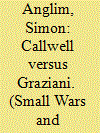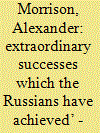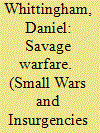|
|
|
Sort Order |
|
|
|
Items / Page
|
|
|
|
|
|
|
| Srl | Item |
| 1 |
ID:
085522


|
|
|
|
|
| Publication |
2008.
|
| Summary/Abstract |
The period from December 1940 through to the spring of 1941 saw the British Army win a series of rapid and decisive victories over Italian and Vichy French forces in North and East Africa and the Middle East. A key feature of these operations was the extensive British use of fast-moving all-arms mobile formations utilising superior speed and mobility to out-manoeuvre considerably larger Italian formations. A number of reasons have been given for the British Army adopting this mode of warfare, but the paper contends that the best explanation is that they were an organic evolution from methods used by the British Army in 'small wars' throughout the early twentieth century, use of mobile 'frontier columns' at the operational and tactical level of war being described and recommended by Callwell himself and visible with the Army in practice in operations in India and the Middle East in particular. The inter-war period saw the combination of this model of warfare with post-First World War military technology, notably tanks, close air support and coordination by wireless. Colonial operations in this period also saw some utilisation of what would later be identified as 'Special Forces' - also used extensively in the Desert War - the most obvious example being Captain Orde Wingate's Special Night Squads in Palestine in 1938.
|
|
|
|
|
|
|
|
|
|
|
|
|
|
|
|
| 2 |
ID:
168212


|
|
|
|
|
| Summary/Abstract |
Charles Callwell’s Small Wars (1896, 1899, 1906) is widely considered both an ur-text for modern counter-insurgency studies, and a primer for the racialized late-Victorian approach to war against ‘savages’: either way it is usually only considered within a British context. Alongside the numerous examples Callwell used from British colonial campaigns, he frequently referred to those of other European powers – notably the Russian conquest of Central Asia. This article will seek to analyse Callwell’s views of Russian colonial warfare, establish the sources on which he relied, and evaluate his accuracy and the effect which the Russian example had on his thinking.
|
|
|
|
|
|
|
|
|
|
|
|
|
|
|
|
| 3 |
ID:
116251


|
|
|
|
|
| Publication |
2012.
|
| Summary/Abstract |
In his classic book Small Wars: Their Principles and Practice (1896), the military theorist Charles E. Callwell divided small wars into three broad classes: wars of conquest were fought to expand empires; pacification campaigns were internal, and often followed campaigns of conquest; campaigns to wipe out an insult, avenge a wrong, or overthrow a dangerous enemy, often developed into wars of conquest. While all three categories involved major political considerations, Callwell's text is often criticised for its lack of discussion of politics. However, Callwell recognised that, if the ultimate objective of a campaign was successfully to assimilate a people into the British Empire, then 'military intimidation' was ill adapted to that end. This article will argue that a strategy of 'butcher and bolt' was indeed considered by many commentators, including Callwell, to be the best way to win 'hearts and minds'. This stemmed from a belief in the all-importance of 'moral effect', a recurring theme in small wars literature. However, to view the British approach to colonial small wars as pure and simple brutality, in a 'dark age' before a more enlightened period of 'minimum force', is an oversimplification.
|
|
|
|
|
|
|
|
|
|
|
|
|
|
|
|
|
|
|
|
|